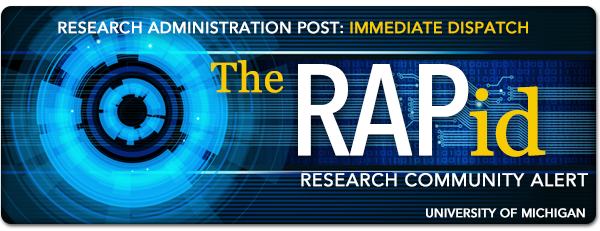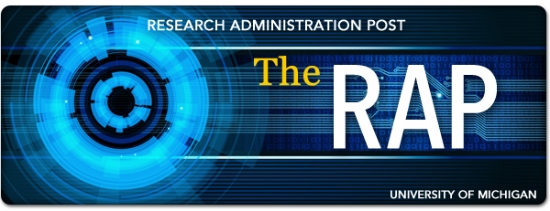-
RAP
Research Administration Post
-
RAR (Regental Action Request)
A Regental Action Request (RAR) is the university form used to request the U-M Board of Regents' approval for conflict of interest situations that meet the State of Michigan Contract Statute for contracts directly or indirectly between the university and one of the university's employees (also known as "statutory conflicts").
For details and submission dates, see Regental Action Requests & COI Review.
-
RASC
-
RCR
Responsible Conduct of Research
-
RDNA
Recombinant DNA Research
-
Recharge
Costs billed for goods or services provided by one internal university unit to other internal university units. The focus is on direct costs when establishing rates, with the intention for the activity to break even. Rates need to be consistently applied to internal users.
Visit this Recharge Basics Overview from the U-M Financial Analysis site.
-
Representations and Certifications
Sometimes called Reps & Certs or Certs & Reps. These required statements must accompany federal contracts & proposals, and which are completed by ORSP, usually at the proposal submission stage.
As part of most federal government sponsored projects proposals, an institutional offical is required to submit certain required information (assurances, certification, and representations). Learn more about the Federal Acquisition Regulation (FAR) Subpart 4.12—Representations and Certifications at http://www.acquisition.gov/.
-
Research Administration Advisory Council (RAAC)
- Bylaws of The Research Administration Advisory Council (RAAC)
- RAAC Minutes and Attachments 06.20.23
- RAAC Minutes and Attachments 11.16.21
- RAAC Minutes and Attachments 2.20.24
- RAAC Minutes and Attachments 2.20.24
- RAAC Minutes and Attachments 3.21.23
- RAAC Minutes and Attachments 3.21.23
- RAAC Minutes and Attachments 4.16.24
- RAAC Minutes and Attachments 4.16.24
- RAAC Minutes and Attachments 5.18.21
- RAAC Minutes and Attachments 6.20.23
- Research Administration Advisory Council (RAAC)
-
Research Administration Post (RAP) or RAP Immediate Dispatch (RAPid)

 Our RAP/RAPid newsletters are used to inform faculty and staff of research-related resources or news at U-M, sponsor news, events, and changes in policies and procedures related to grants and sponsored projects.
Our RAP/RAPid newsletters are used to inform faculty and staff of research-related resources or news at U-M, sponsor news, events, and changes in policies and procedures related to grants and sponsored projects. -
Research Award Terms & Conditions (RTC)
The National Science Foundation (NSF) serves as the official web host of participating agency documents relating to the RTCs. The various Award Terms and Conditions are available and hosted by the National Science Foundation (NSF), but they impact all federal agencies. (Note that NSF is hosting a webinar series as they archiving and replacing these in 2024.)
In addition to the basic provisions, each member federal agency has a supplemental set of agency-specific terms and conditions. A typical grant is covered by both the federal-wide Research Terms and Conditions (RTC) and the agency-specific terms and conditions.
-
Research Faculty
Non-tenured research faculty. See the Research Faculty web page for more information.
-
Research Integrity
Parent term for federal, state, and university policies regarding responsible conduct of research, including policy and procedures relating to research misconduct

- 5 Ways Supervisors Can Promote Research Integrity Office of Research Integrity (ORI) infographic. Download and post in your unit or use as part of your unit's RCR training.
- Defining the Role of Author and Contributors ICMJE guideance that describes the importance of authorship and defines the basis for authorship and non-author contributors.
- Department of Defense Research Integrity and Misconduct (PDF download, 2016)
- Department of Energy Includes a defintion of research misconduct under federal policy and links to policies and procedures
- Department of Labor Scientific Integrity: Statement of Policy (PDF, 2013)
- Guidelines for Authorship and Avoiding Authorship Disputes (PDF) U-M Office of Research (UMOR) guidance that supplements the university's "Policy Statement on the Integrity of Scholarhsip," SPG 303.03
- Montreal Statement on Research Integrity (PDF) Outlines the responsibilities of individuals and institutions when collaborating in cross-boundary research; builds upon the responsibilities defined in the Singapore Statement.
- NSF RCR Resources National Science Foundation web page with links to policy, FAQs, etc. regarding responsible conduct of research training for undergraduates, graduate students, and postdoctoral researchers supported by NSF funds to conduct research.
- ORI: List of Federal Misconduct Policies The Public Health Service (PHS) Office of Research Integrity (ORI) maintains a list of links to the research misconduct policies for the following agencies: Health and Human Services (HHS), which includes PHS; National Science Foundation (NSF); Department of Transportation (DOT); Department of Veterans Affairs; Environmental Protection Agency (EPA); National Aeronautics and Space Administration (NASA); National Endowment for the Humanities (NEH)
- Policy Statement on the Integrity of Scholarship and Procedures for Investigating Allegations of Misconduct in the Pursuit of Scholarship and Research SPG 303.03. Includes a full description of the major types of misconduct activity and each step in U-M's scholarship and research misconduct procedures
- Procedures for Investigating Allegations of Misconduct in the Pursuit of Scholarship and Research under SPG 303.03 Defines research misconduct and other violations of research integrity per the University's Integrity of Scholarship and Research policy (SPG 303.03) and outlines the review and investigation processes the University follows to evaluate an allegation of research misconduct. Last Updated: 10/06/2020
- Singapore Statement on Research Integrity Webiste outlining research integrity principles and responsibilities for the international research community; designed to foster global research integrity.
-
Research Subject Fees
Human subjects often are paid a fee for their participation in research projects. Protocols for the use of human beings in research, teaching, or testing are reviewed and approved, according to federal, state and university policies. (See: Human Research Protection Program). For payment policies and details on paying subjects, see Standard Practice Guide 501.7-1. Also see the University's Human Subject Incentive Program (HSIP) at http://www.finance.umich.edu/treasury/hsip or email [email protected].
See also: Human Subjects Incentives Program (HSIP).
-
RFA
Request for Application
-
RFI
Request for Information
-
RFP
Request for Proposal
-
RFQ
Request for Quote
-
RIF
Reduction in Force
-
Routine/Commercial Testing
Routine or commercial testing is a type of "Other Sponsored Activity." It generally involves repetitive, quantitative, non-experimental measurements under physically controlled conditions for which the data produced are expected to be within a pre-determined range of values or of reproducibility. University researchers may choose to conduct some testing if certain conditions apply.
-
RPC
Radiation Policy Committee
Enterprise
Enterprise
As the nation’s largest public research university, the Office of the Vice President for Research (OVPR) aims to catalyze, support and safeguard U-M research and scholarship activity.
The Office of the Vice President for Research oversees a variety of interdisciplinary units that collaborate with faculty, staff, students and external partners to catalyze, support and safeguard research and scholarship activity.
ORSP manages pre-award and some post-award research activity for U-M. We review contracts for sponsored projects applying regulatory, statutory and organizational knowledge to balance the university's mission, the sponsor's objectives, and the investigator's intellectual pursuits.
Ethics and compliance in research covers a broad range of activity from general guidelines about conducting research responsibly to specific regulations governing a type of research (e.g., human subjects research, export controls, conflict of interest).
eResearch is U-M's site for electronic research administration. Access: Regulatory Management (for IRB or IBC rDNA applications); Proposal Management (eRPM) for the e-routing, approval, and submission of proposals (PAFs) and Unfunded Agreements (UFAs) to external entities); and Animal Management (for IACUC protocols and ULAM).
Sponsored Programs manages the post-award financial activities of U-M's research enterprise and other sponsored activities to ensure compliance with applicable federal, state, and local laws as well as sponsor regulations. The Office of Contract Administration (OCA) is also part of the Office of Finance - Sponsored Programs.